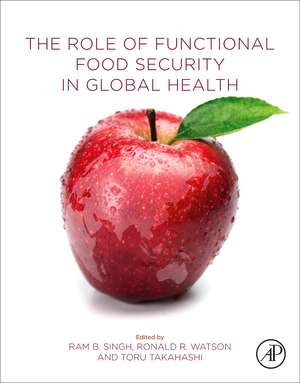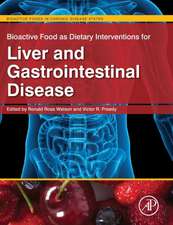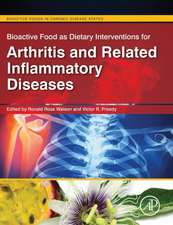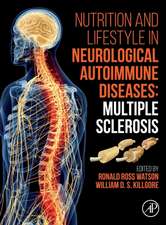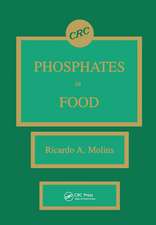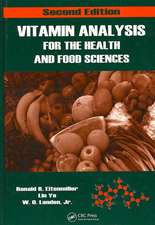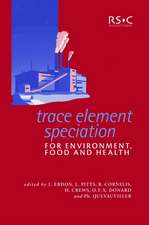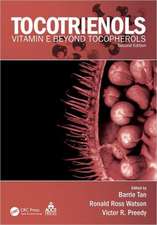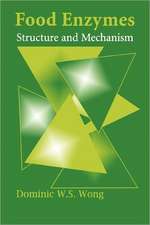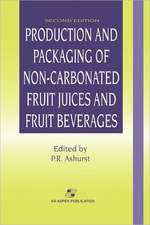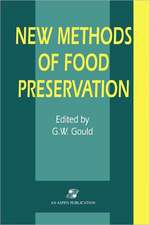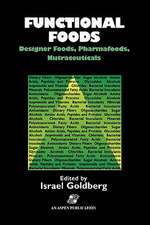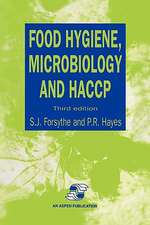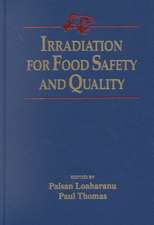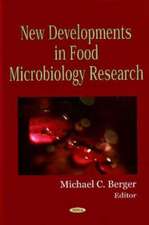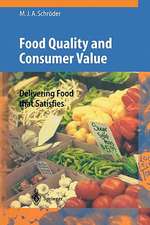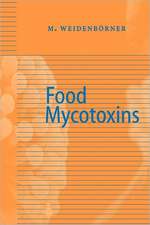The Role of Functional Food Security in Global Health
Editat de Ronald Ross Watson, Ram B. Singh, Toru Takahashien Limba Engleză Paperback – 13 noi 2018
This book will be a great resource to the food industry as it presents the most efficient ways to use technology to manufacture slowly absorbed, micronutrient rich functional foods by blending foods that are rich in healthy nutrients.
- Provides greater knowledge on functional food security
- Highlights the necessary changes to the western diet that are needed to achieve food security
- Explains the utility and necessity of functional food security in the prevention of noncommunicable diseases
- Presents policy changes in food production for farmers and the larger food industry
- Offers suggestions on what can be done to enhance functional food production while simultaneously decreasing production costs
Preț: 915.13 lei
Preț vechi: 1272.86 lei
-28% Nou
Puncte Express: 1373
Preț estimativ în valută:
175.11€ • 183.32$ • 144.89£
175.11€ • 183.32$ • 144.89£
Carte tipărită la comandă
Livrare economică 31 martie-14 aprilie
Preluare comenzi: 021 569.72.76
Specificații
ISBN-13: 9780128131480
ISBN-10: 0128131489
Pagini: 792
Dimensiuni: 191 x 235 mm
Greutate: 1.33 kg
Editura: ELSEVIER SCIENCE
ISBN-10: 0128131489
Pagini: 792
Dimensiuni: 191 x 235 mm
Greutate: 1.33 kg
Editura: ELSEVIER SCIENCE
Public țintă
food scientists, nutritionists, dietitians, physicians (including those who practice general medicine, cardiologists, those who treat diabetes), pharmacists, biochemists, and agencies whose work is related to diet as a risk factor of diseases (e.g. FAO, WHO, WHF, AHA), and studentsCuprins
Section 1: World Population and Food Availability
1. Estimates for World Population and Global Food Availability for Global Health
2. Estimates of Functional Foods Availability in Ten Highly Populated Countries
3. The Singh's Concept of Functional Foods and Functional Farming (4F) for World Health
4. Economic Burden of Noncommunicable Diseases and Economic Cost of Functional Foods for Prevention
Section 2: Evolutionary Diet, Western Diet and NCDS
5. Evolutionary Diet and Evolution of Man
6. Globalization of Diets and Risk of Noncommunicable Dieseases
7. A Review on the Nutritional Challenges of School Children from the Perspective of Developing Countries
8. Functional Food Security for Prevention of Obesity and Metabolic Syndrome
9. Functional Food Security for Prevention of Diabetes Mellitus
10. Functional Food Security for Prevention of Cardiovascular Diseases
11. Effects of Western Style Foods on Risk of Non-Communicable Diseases
12. Role of Food and Nutrition in Cancer
13. Low Protein Rice: Medical Rice for Chronic Kidney Disease
Section 3: Fatty Acids in the Diet and NCDS
14. High Omega-6/Omega-3 Fatty Acid Ratio Diets and Risk of Non-Communicable Diseases: Is the Tissue the Main Tissue?
15. Fatty Acids in Human Diet and Their Impact on Cognitive and Emotional Functioning
Section 4: Western Type Foods
16. Fats and Oils for Health Promotion and Disease Prevention
17. Dietary Sugar Intake and Risk of Noncommunicable Diseases
18. Modern Eggs, Not Wild Type Eggs, Predispose Risk of Cardiovascular Disease, Diabetes and Cancer?
Section 5: Functional Foods in the Diet
19. Cocoa Consumption and Prevention of Cardiometabolic Diseases and Other Chronic Diseases
20. Can Nuts Consumption Modulate Cardiovascular Diseases? Report of a Case and Review of Literature
21. Guava Enriched Functional Foods: Therapeutic Potentials and Technological Challenges
22. Health Effects and Safety of Soy and Isoflavones
23. Quark Cheese: Characteristics, Preparation and Recent Advances as a Functional Food
24. Nutraceuticals
Section 6: Bee Products
25. Trigona Propolis and Its Potency for Health and Healing Process
26. The Role of Bee Products in the Prevention and Treatment of Cardiometabolic Disorders: Clinico-pharmacological and Dietary Study
27. Millets as Functional Food, a Gift from Asia to Western World
Section 7: Spices as New Functional Foods
28. Fenugreek (Trigonella foenum-graecum L.): Distribution, Genetic Diversity and Potential to Serve as an Industrial Crop for the Global Pharmaceutical, Nutraceutical and Functional Food Industries
29. Functional and Therapeutic Applications of Some Important Spices
Section 8: Nutrition, NCDS and Brain Dysfunction
30. Altered Circadian Energy Metabolism and Chronobiological Risk Factors of Chronic Diseases
31. Diet and Cancer: A Dysfunction of the Brain
32. Antioxidant Diets and Functional Foods Promote Healthy Aging and Longevity Through Diverse Mechanisms of Action
33. Beneficial Uses of Cinnamon in Health and Diseases: An Interdisciplinary Approach
Section 9: Probiotics and Microbiome
34. Safety of Probiotics in Health and Disease
35. Developments on the Applications and the Suitability of Functional Fermented Sour Sobya as a Viable Source of Novel Probiotics in the Managements of Gastrointestinal Disorders and Blood Lipid Profiles
36. Bioactive Olive Oil Polyphenols in the Promotion of Health
37. Functional Food Security for Osteoporosis, Carcinogenesis, Atherosclerosis and Brain Degeneration
38. Modernization of Policy for Food Manufacturing and Farming May Be Necessary for Global Health
39. Epigenetic Modulation of Nutritional Factors in Plants, Animals and Humans: A New Approach for Developing Functional Foods
40. Effects of Diet and Nutrients on Epigenetic and Genetic Expressions
1. Estimates for World Population and Global Food Availability for Global Health
2. Estimates of Functional Foods Availability in Ten Highly Populated Countries
3. The Singh's Concept of Functional Foods and Functional Farming (4F) for World Health
4. Economic Burden of Noncommunicable Diseases and Economic Cost of Functional Foods for Prevention
Section 2: Evolutionary Diet, Western Diet and NCDS
5. Evolutionary Diet and Evolution of Man
6. Globalization of Diets and Risk of Noncommunicable Dieseases
7. A Review on the Nutritional Challenges of School Children from the Perspective of Developing Countries
8. Functional Food Security for Prevention of Obesity and Metabolic Syndrome
9. Functional Food Security for Prevention of Diabetes Mellitus
10. Functional Food Security for Prevention of Cardiovascular Diseases
11. Effects of Western Style Foods on Risk of Non-Communicable Diseases
12. Role of Food and Nutrition in Cancer
13. Low Protein Rice: Medical Rice for Chronic Kidney Disease
Section 3: Fatty Acids in the Diet and NCDS
14. High Omega-6/Omega-3 Fatty Acid Ratio Diets and Risk of Non-Communicable Diseases: Is the Tissue the Main Tissue?
15. Fatty Acids in Human Diet and Their Impact on Cognitive and Emotional Functioning
Section 4: Western Type Foods
16. Fats and Oils for Health Promotion and Disease Prevention
17. Dietary Sugar Intake and Risk of Noncommunicable Diseases
18. Modern Eggs, Not Wild Type Eggs, Predispose Risk of Cardiovascular Disease, Diabetes and Cancer?
Section 5: Functional Foods in the Diet
19. Cocoa Consumption and Prevention of Cardiometabolic Diseases and Other Chronic Diseases
20. Can Nuts Consumption Modulate Cardiovascular Diseases? Report of a Case and Review of Literature
21. Guava Enriched Functional Foods: Therapeutic Potentials and Technological Challenges
22. Health Effects and Safety of Soy and Isoflavones
23. Quark Cheese: Characteristics, Preparation and Recent Advances as a Functional Food
24. Nutraceuticals
Section 6: Bee Products
25. Trigona Propolis and Its Potency for Health and Healing Process
26. The Role of Bee Products in the Prevention and Treatment of Cardiometabolic Disorders: Clinico-pharmacological and Dietary Study
27. Millets as Functional Food, a Gift from Asia to Western World
Section 7: Spices as New Functional Foods
28. Fenugreek (Trigonella foenum-graecum L.): Distribution, Genetic Diversity and Potential to Serve as an Industrial Crop for the Global Pharmaceutical, Nutraceutical and Functional Food Industries
29. Functional and Therapeutic Applications of Some Important Spices
Section 8: Nutrition, NCDS and Brain Dysfunction
30. Altered Circadian Energy Metabolism and Chronobiological Risk Factors of Chronic Diseases
31. Diet and Cancer: A Dysfunction of the Brain
32. Antioxidant Diets and Functional Foods Promote Healthy Aging and Longevity Through Diverse Mechanisms of Action
33. Beneficial Uses of Cinnamon in Health and Diseases: An Interdisciplinary Approach
Section 9: Probiotics and Microbiome
34. Safety of Probiotics in Health and Disease
35. Developments on the Applications and the Suitability of Functional Fermented Sour Sobya as a Viable Source of Novel Probiotics in the Managements of Gastrointestinal Disorders and Blood Lipid Profiles
36. Bioactive Olive Oil Polyphenols in the Promotion of Health
37. Functional Food Security for Osteoporosis, Carcinogenesis, Atherosclerosis and Brain Degeneration
38. Modernization of Policy for Food Manufacturing and Farming May Be Necessary for Global Health
39. Epigenetic Modulation of Nutritional Factors in Plants, Animals and Humans: A New Approach for Developing Functional Foods
40. Effects of Diet and Nutrients on Epigenetic and Genetic Expressions
